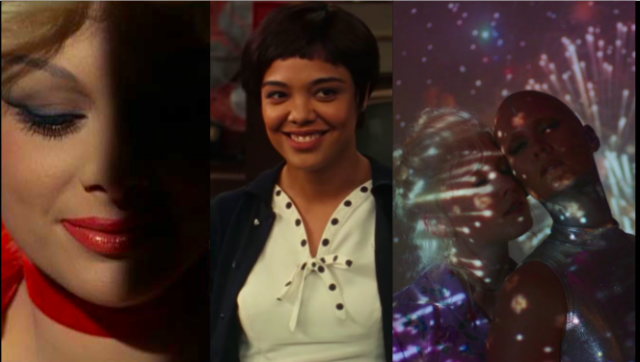Scott’s Movie Journal #3

In Name Only (John Cromwell, 1939)
(first view)
If anyone told me there was a 30s movie with Carole Lombard, Cary Grant, and Kay Francis, my first guess wouldn’t necessarily be a life-and-death melodrama, but here we are. Everyone is quite good, and there’s a lovely, bitter Christmas section towards the end, but even by melodrama’s standards, Francis’s character is one hell of a manufactured creation.
Othello (Orson Welles, 1951)
(second view; last seen in 2014)
Top-three Welles for me, just behind Chimes at Midnight and The Magnificent Ambersons, and one of the best direct adaptations of Shakespeare I’ve yet seen. Welles “opens up” the play in an interesting way, packing the castle’s environment with background players, and giving us just a slight glimpse of the outside world. This helps to cement just how locked-in everyone here is, and suggests how easy it starts to be to believe just about anything, because your mind can’t think much further than what’s in front of you. Shakespeare’s dialogue also just works insanely well in Welles’ familiarly rapid rhythms.
The Midnight Sky (George Clooney, 2020)
(first view)
The gap between Clooney’s skill as an actor and his almost-total lack of talent as a director continues to confound. There are some decent individual sequences, but the whole shape of the picture is a complete mess, and the narrative conceit, once revealed, flattens the whole thing to almost nothing. Not for the first time does Alexandre Desplat distinguish himself as the project’s most valuable player, delivering one of his best scores.
Promising Young Woman (Emerald Fennell, 2020)
(first view)
Resists what some pretty clear acidic impulses, constantly undercutting itself, but Mulligan keeps it focused in a productive way towards the push-pull a lot of us experience these days between relentlessly pursuing a sense of personal righteousness and just wanting to move on with your day and life.
Nights of Cabiria (Federico Fellini, 1957)
(second view, last saw in 2010)
Man, I mourn the time this spent out of print and languishing in a copyright mess, because as much as this held firm in my mind as an absolute stone-cold classic, it was so much better than I even remembered. Fellini’s aesthetic was soon to explode with his following few films, but the roots are really here – the way characters seem to walk out into the audience, or the camera wander through a party – and Giulietta Masina’s performance is simply one of the best ever captured on film. She’s somehow screaming to the rafters and quiet as a mouse, totally in tune with the placement of the camera, the mood of the scene, the point in the story (not always a natural find in this elliptical structure), and completely without limitation.
Juliet of the Spirits (Federico Fellini, 1965)
(second view, last saw in 2013)
Really where the “Felliniesque” starts, for me; where his whims get really wild and his restrictions fewer. The color helps as well, of course.
Pixote (Héctor Babenco, 1981)
(first view)
I have absolutely no interest in movies about kids in prison or poverty (these kids go through both); it invites a sort of reflective depression and rage that I just don’t tend to respond to, or, perhaps if I’m being more honest, just a sort of unpleasantness. I don’t mind depressing films, but I often struggle with unpleasant ones. And this sure is that, but I’m glad Criterion included it in their latest World Cinema set, because it’s really, really, really good. It’s unpleasant for sure, and I’m probably not going to start seeking out a ton more like it, but once every so often, something like this can hit just right.
The Trial of the Chicago 7 (Aaron Sorkin, 2020)
(first view)
Like a lot of left-leaning people in my generation, The West Wing was a major cornerstone of a certain period of my life, and it’s honestly taken a lot to disabuse of the notion that he’s essentially extremely talented. The final nail was Molly’s Game, his directorial debut, one of his worst scripts, and one of the worst ways I’ve seen his writing handled onscreen. That Chicago 7, his second film behind the camera, is an improvement is the thinnest of possible compliments, but broadly speaking it is a pretty sharp script, condensing over a year of events into a pretty quick-paced 130-minute film. The problem, though, remains Sorkin’s direction, which is just pleased as punch over the dialogue and can’t find the footing to ground this in reality outside of taking it as read that we all know it, y’know, really happened.
The real culprit from where I’m sitting is in the costuming, which, like a lot of modern period pieces, is just way too slick and clean-pressed. More than just a strange curio, it subconsciously removes these proceedings from their historical context, turning it all into dress-up and the drama into re-enactment. It serves to distance us from the concerns on display, which I scarcely need to remind you in this the year of our Lord 2020 are more relevant than ever, but by situating us so extremely in The Past, we’re meant to believe that the modern parallels don’t quite hold up, the way many will say, well, sure, the Civil Rights Movement of the 1960s was great, but Black Lives Matter is just taking things too far, as though they aren’t really insisting on the same sort of changes.
So that bugged me. But I am still a sucker for quick dialogue about politics, so against my better judgment, I must confess I enjoyed it.
The Way Back (Gavin O’Connor, 2020)
(first view)
“It’s not whether you win or lose, it’s how you play the game.”
I must have heard that five hundred times growing up, especially in the five years I played youth league basketball. Yet it’s rarely reflected in sports movies, where it turns out it really does matter whether you win or lose. The underdog story demands overcoming your obstacle, and the main obstacle is usually that you’re just losing too damn much.
Jack Cunningham (Ben Affleck) is most certainly losing too much. He’s lost his wife, his family, and most of his self-worth in booze. When he gets a call out of the blue to coach the Catholic high school basketball team where he was once a star player, we don’t know if it’s a genuine offer or an olive branch extended out of pity. It’s just to finish off the season, anyway – the head coach is out after a heart attack – and the team isn’t really all that good, so throw this guy a bone, let the game keep both him and the kids out of trouble, really no risk of harm. For the first few weeks, that’s all it is; and then it all starts clicking.
There isn’t a big speech. There isn’t much of a decisive moment. O’Connor and screenwriter Brad Ingelsby play the movie like Jack tells the kids to play the game – bit by bit, point by point, just keep chipping away at it, and you’ll either pull off a victory or at least get there honestly.
Much has been made of the real-life parallels between Jack’s alcoholism and Affleck’s own struggles with the same, and while I have to imagine boozing out as a construction worker and doing so as a millionaire probably look a little different week to week, Affleck’s performance is marked by several really well-worn touches that most alcoholic stories seem to miss. Jack’s sober hours are marked by a sort of wheeze in his voice, straining for that next drink; every hint of confrontation brings with it an instant defensiveness that sets into his eyes before it does his speech. It’s easy to psychoanalyze someone who’s in the papers as much as Affleck is, but regardless of where it comes from, it gives a lot of texture, nuance, and depth to how desperate Jack is to not be himself, and makes it all the more stirring once he starts to.
But this isn’t a film about winning. This is about playing the game. That mantra has a very Catholic ethos to it, and it’s fitting that the priest who looks over the team reminds Jack of the same – the point of the school’s basketball program is not to win basketball games, but to build men of integrity. And despite the wins, Jack is not yet one himself. So that becomes the movie’s focus, and that’s where it really distinguishes itself into something as both a sports movie and an addiction drama, letting both ends of his life inform the other without one absolving him of anything. It’s a strikingly mature film, wonderfully acted throughout and poignantly inconclusive about where our lives might lead.
Sylvie’s Love (Eugene Ashe, 2020)
(first view)
Two fairly distinct halves – the first concerned with longing gazes and stolen youth, the second a flurry of melodrama – both of which are very deeply My Shit, their relative absence in any decent form in the American cinema only heightening the beauty writer/director Ashe, his formidable cast (headed by burgeoning star Tessa Thompson and relative newcomer Nnamdi Asomugha) and cinematographer Declan Quinn have wrought onscreen. I love it for its artificial sense of place that is neither our world nor pure invention; I love it for telling a love story and taking it seriously; I love it for the way the camera levitates above Sylvie (Thompson) and her cousin Mona (Aja Naomi King); I love it for its patience and cool and calm and the pure pleasure it takes in just watching people drift through an evening or a week. I love its soundtrack, chock full of both the hits and obscurities of the late 50s and early 60s. I love that Jemima Kirke’s credit is simply “as Countess.” I love the fashions and how everyone wears them. I love Tessa Thompson’s vocal patterns, raised as her character is to be proper at all times, and the way you can hear her contradicting her inner desires as she maintains propriety. I love that Lance Reddick finally got a role that isn’t all about him being shadowy and creepy.
I love, most of all, that Ashe simply embraced the aesthetics of romance films without trying to be arch and postmodern about them. This is an uncynical, full-on tearjerker that works not because it subverts the genre but because it upholds it, expands it, makes it wider and better than segregated production models of the midcentury could ever have allowed. It’s a black film that’s not not about race; it’s just not all about race. It’s about music and TV and the weather and what happens when you lose a few years without the person who made you whole. It’s about how that happens to everyone, all the time, every day, and even if we had fifty movies like this a year, they wouldn’t be half this well-made.
Let Them All Talk (Steven Soderbergh, 2020)
(first view)
While I am generally a fan, Steven Soderbergh has become increasingly reliable on the quality of his screenplay to see him through. Where 7-12 years ago, he could take a bit of genre silliness (like Side Effects and Contagion) or films with very little active writing (as in The Girlfriend Experience, most of which was improvised, and Che, much of which was dialogue-free) and wring from it something bold and provocative. Maybe it’s just due to every film since Che operating in the same aesthetic playground – wide-angle lenses, camera as low as possible, soft but bold colored filters/lights, cuts that clip the dialogue off before doubling down on itself – or maybe The Laundromat really was just that bad, but the shine’s wearing off for me. The lack of screenplay is a bit of a liability here, with a cast that, aside from Meryl Streep, never really seems at ease with the whole exercise of improvising most of their dialogue. There’s a distinction in improv between characters feeling ill and ease and actors searching for something to say, and far too often I saw the latter plainly at work. It also finds the familiar improv problem of spending too much time creating amusing asides and not really working in the drama until it starts to reach its conclusion and it suddenly has a ton of catch-up to do to wrap things up. Streep, Dianne Wiest, and Candice Bergen are of course welcome in a movie anytime, and all find solid beats here and there, but the shape of the film is not doing them many favors outside of a few memorable bits.
Wild Mountain Thyme (John Patrick Shanley, 2020)
(first view)
Those who most strongly associate the theatre with loud confrontations flocked to praise Doubt, and now that they’re confronted with another very prominent side of the stage – slightly-surreal portraits of stasis – suddenly no one’s a theatregoer. Oh well. It’s not a question as to whether Wild Mountain Thyme, based on Shanley’s 2014 play Outside Mullingar, is weird. It most certainly is. The question is whether that oddity draws out of the piece something true and honest and revealing. And it is damn honest. Honest about the boxes we put ourselves in, only to wonder how the hell we got so limited about everything, and about how hauntingly strange it is to start to break out of them, and how much can inadvertently come pouring out once that dam starts to break.
Babyteeth (Shannon Murphy, 2020)
(first view)
Accept the premise – a teenage girl with cancer, whose father is a psychiatrist and mother is addicted to prescription pills, falls in love with a 23-year-old homeless drug addict who doesn’t necessarily share her affections – and move past it. Then accept my excuse – this is not the teenage-girl-with-cancer-and-complicated-family-dynamic-who-falls-in-love-with-a-drug-addict story you’re expecting! – and keep on moving. Then watch the movie, which is so consistently surprising and unusual, so beyond the expectations it engenders even as it’s progressing, so nimble in how it gets to each unexpected beat, so beautiful, and so very very touching. I almost never even consider a debut film as a possibility for the year’s best, but it’s been a long time since I’ve come across a debut that’s at once this adventurous and assured. Eliza Scanlen (the girl), Ben Mendelsohn (the father), Essie Davis (the mother), and Toby Wallace (the addict) are all so good, never pigeonholing their characters into their types, each as surprising moment to moment as the film they’re building, yet never going so off-kilter that they lose the thread they’re building. How a first-time director orchestrated a cast this talented into doing work this seemingly-untethered while maintaining a complete whole of a film I’ll never know. It’s as good as they get.
Another Round (Thomas Vinterbeg, 2020)
(first view)
Four male high school teachers – lead by the always-exciting Mads Mikkelsen – decide to improve their lives through rigid and measured alcohol consumption, to predictable ends. The film is a little less convinced of their eventual downfall than it is their momentary highs, and especially viewed a day after The Way Back, it’s hard not to notice how detached this is from the lasting effects of alcoholism. The end, joyously-mounted as it is, seems especially incongruous, given the immediately-preceding events.





























